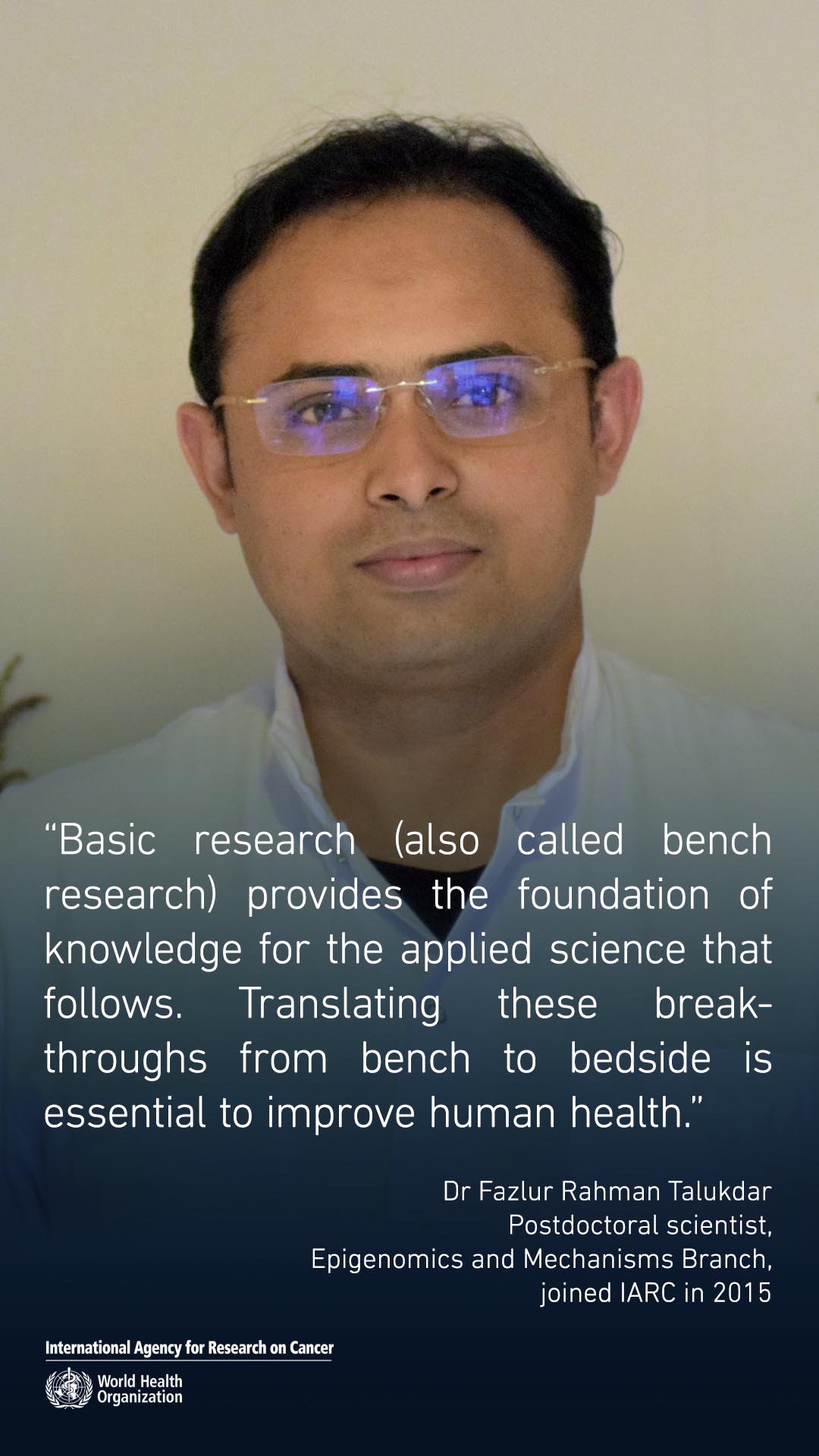Portraits of Scientists Home
❝Basic research (also called bench research) provides the foundation of knowledge for the applied science that follows. Translating these breakthroughs from bench to bedside is essential to improve human health.❞
Please introduce yourself. How long have you worked at IARC, and where did you work before?
I’m Fazlur Rahman Talukdar, a postdoctoral scientist in the Epigenomics and Mechanisms Branch. I joined IARC in 2015, and I am a molecular biologist, with a specialty in cancer epigenetics. My work involves both benchwork experimentation and the analysis of the generated data using bioinformatics tools.
Before coming to IARC, I was working as an adjunct lecturer in the Department of Biotechnology at Assam University in India, where I also obtained my PhD, in epigenomics of oral and oesophageal cancer.
What are the most interesting projects you are currently involved in, and why are they important?
I’m currently leading two projects. The first focuses on understanding the epigenetic mechanisms of oesophageal squamous cell carcinoma (ESCC) in high-incidence populations in low- and middle-income countries in Africa, South-East Asia, and South America. This is one of the first projects to identify crucial tumour-specific DNA methylation events in ESCC development based on genome-wide approaches.
The other project is to understand the molecular etiology of colorectal cancer in countries in Central and Southern Europe. This will be a novel study where we will identify diet- and lifestyle-associated epigenetic determinants of colorectal cancer risk, which will help in risk stratification and early detection.
In both these projects, I am coordinating the collaborations for project administration, which involves obtaining ethical clearances for project execution, collecting biospecimens and data, experimentation and molecular analysis, preparing manuscripts, and writing grant applications to support these projects.
What do you do when you’re not doing research at IARC?
When I’m not doing research, you might find me playing cricket for Rhône Cricket Club or travelling (of course before the COVID-19 pandemic).
Why did you move into research?
I moved into research because I wanted to explore deeper into biological science from my high school days. I was fascinated with topics such as the central dogma of molecular biology and protein synthesis, which are about the mechanisms of gene expression. I was intrigued to learn more about the regulation of gene expression (protein synthesis) and how this is altered in disease conditions. Basic research (also called bench research) provides the foundation of knowledge for the applied science that follows, and translating our breakthroughs from bench to bedside is essential to improve human health.
After my master’s degree, I was sure I wanted to pursue research as a career, and while selecting my PhD research topic I came across the field of epigenetics, which is the branch of molecular biology that deals with gene regulation. Because this was my topic of interest from my schooldays, I decided to study the epigenetic etiology of oral and oesophageal cancer in my PhD, and I have been pursuing research in the same field ever since.
Which personal scientific contribution are you most proud of?
I am delighted about our recent publication related to the ESCC project, where we identified crucial tumour-specific molecular (DNA methylation) events and proposed a novel early detection marker panel. Our discovery of critical genes and molecular events presents interesting avenues for mechanistic studies and biomarker development for early diagnosis in low-resource settings. These results were published in the article “Genome-wide DNA methylation profiling of esophageal squamous cell carcinoma from global high-incidence regions identifies crucial genes and potential cancer markers” in the journal Cancer Research.
What is something you do now because of research you’ve read?
I have started using less plastic, after learning about its long-term effects on the environment. Although it is very difficult to completely eliminate plastics from our lives, I try to reduce the use by replacing plastic with alternatives, like glass jars and paper or cloth bags.
